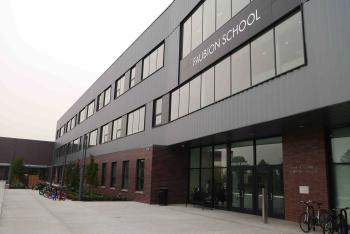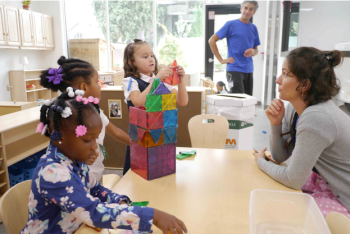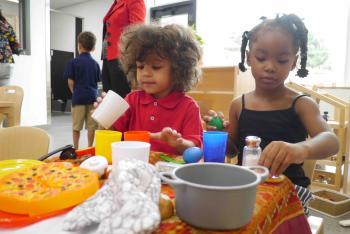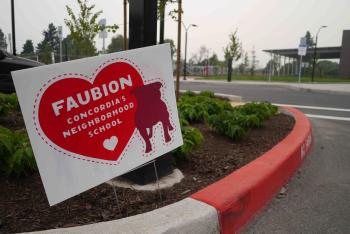When leaders and families in the Faubion community got the chance to rebuild Faubion School, a PK-8 school in Portland’s Concordia neighborhood, they knew it was a chance to do something different.
They wanted a place where families belonged—a place with heart that created a safer, healthier, more educated community from early learning through “pursuing One’s Highest Dreams” (3 to PhD™). It took strong collaboration with partners, including Concordia University, Trillium Family Services, Basics, Kaiser Permanente, and Early Learning Multnomah. The result is a promising educational model that is unlike anything else in the country.
Closing the opportunity gap
Faubion already has many great things going for it. The surrounding neighborhood is home to a rich diversity of families. Concordia University, which runs one of the country’s premier education schools, is located next door. Faubion has even been honored by the State of Oregon for closing the achievement gap in 2006.
Yet, many families in the community still face significant obstacles. More than 80% of the children attending Faubion qualify for free or reduced lunch. Food insecurity is a big issue for many families. It doesn’t help that the school is in a food desert—a neighborhood with little access to affordable, fresh and healthy foods. Options for quality, affordable childcare and preschool are also severely limited.
Leaders hoped the new school would help close the opportunity gap for the most vulnerable children and families in the community, and restore the school as the “heartbeat of the community.”
One-stop, wraparound support for families
After opening its doors in September 2017, the newly built Faubion School now supports the whole family with wraparound services.
“Mom only has to go to one place that can help with whatever the family needs,” said Faubion Principal Jennifer McCalley.
Not only is Faubion a fully functioning K-8 school, it is also a child care center, preschool, food pantry, grocery, clothes closet, and clinic for Faubion families. On top of that, the school is co-located with Concordia University’s School of Education, which means a plentiful supply of qualified volunteers and a built-in spark for students to dream about the possibilities of higher education.
Families have access to healthy, organic food at affordable prices at Faubion’s food club, which cuts down on unhealthy, expensive options they might get elsewhere. Nurses and doctors at the Kaiser Permanente clinic can take families to the in-house grocery to teach them how to read labels, or even use the demonstration kitchen on site to share hands-on tips for preparing healthy meals.
"The benefit for us is this ripple effect. It’s impacting the entire family,” says Jason Roepel, Program Administrator for Early Learning at Portland Public Schools.
Roepel and Principal McCalley say that attendance is improving and tardies are decreasing, too. They attribute that to the single campus solution, which means families aren’t driving or riding the bus from school to school, but instead going to one building to drop off every child from six-week-old infants to 8th graders. Having many ages on the same campus also means that children have more leadership opportunities and fewer building transitions when moving from grade to grade.
“Everyone knows everybody right from the start,” said Principal McCalley, who makes a point to personally greet each family walking through the door each morning. “That’s why families feel safe here and kids feels safe here.”
Starting with early childhood
One of the hardest transitions kids make is starting kindergarten. So, in designing the school, leaders paid special attention to integrating early learning opportunities for the youngest in the community.
Preschool experience is a big predictor of success in kindergarten. Before Faubion had early childhood classrooms incorporated into the school, only about 3 or 4 children out of 80 arriving at kindergarten had any preschool experience. In 2017, 42 children graduated from Faubion preschool classrooms into Faubion kindergarten classrooms.
The transition is easier for Faubion students because preschoolers can see the kindergarten classrooms through large, open windows from Faubion’s early learning wing. By the time children are moving on to kindergarten, they already know what the classrooms look like and they know all the kindergarten teachers by name.
Principal McCalley and Jason Roepel, also thought outside the box when it came to funding for the preschool and early Head Start classrooms. Traditionally, funding streams are kept separate, but Roepel and McCalley were concerned that separated funding could lead to inequities from classroom to classroom.
“You could have a four-year-old get a different experience based on the funding for that room. That’s not right. And that’s not the kind of conversation we wanted to have with families,” said Principal McCalley.
Instead, they braided funding together—from Preschool Promise, Title I, Title VI, and Concordia University—to create five, integrated preschool classrooms that serve 100 children with a diverse mix of socioeconomic backgrounds.
“We wanted to do what’s right for kids and families, so we intentionally broke a lot of systems that had been the norm,” said Principal McCalley.
Brave enough to think differently
Early Learning Multnomah (ELM) is proud to be a part of Faubion’s innovative new model by providing Preschool Promise funding for two classrooms worth of preschool teachers and students. ELM staff was there to see Faubion’s new building open in September and we can’t wait to see the long-term impact on children and families in the community.
“When you are trying to put something innovative through, it takes a lot of people saying the same thing and supporting it to make it happen. ELM advocated for us,” said Principal McCalley.
“We’d like to thank all of our partners for being brave. We have the idea and, but it takes people listening, understanding, and thinking differently to do what’s right for kids."




